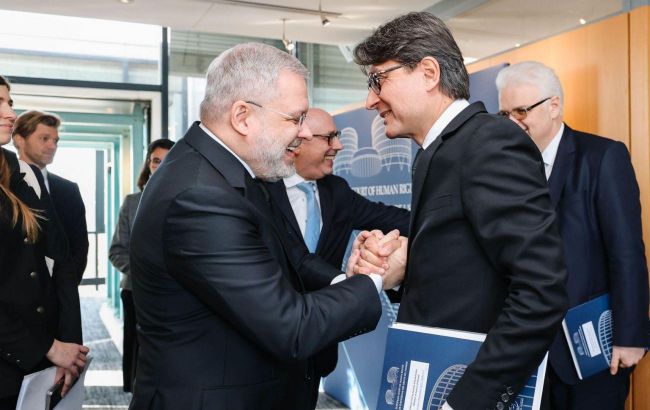ECHR decisions favor Ukraine in two cases against Russia
 Meeting of Herman Halushchenko and Matthias Guiomar (Photo: Facebook of Herman Halushchenko)
Meeting of Herman Halushchenko and Matthias Guiomar (Photo: Facebook of Herman Halushchenko)
Ukraine has four cases against Russia pending at the European Court of Human Rights, and unprecedented rulings have already been issued in two of them, according to Ukrainian Justice Minister Herman Halushchenko on Facebook.
Halushchenko reported that during his visit to Strasbourg, he met with the President of the European Court of Human Rights, Matthias Guiomar.
“We discussed how important Ukraine’s cooperation with the ECHR is today,” the minister noted.
The Ukrainian official said that one of the topics of the meeting was Ukraine’s cases against Russia concerning systemic and mass human rights violations in the occupied territories since 2014.
According to Halushchenko, Ukraine currently has four cases against Russia pending at the Court. Unprecedented rulings have already been issued in two of them, confirming numerous crimes committed by Russia, though the Justice Minister did not provide further details.
“I thanked the ECHR President for his principled stance in these cases, emphasizing that these rulings play a key role in documenting crimes and ensuring Russia’s international accountability,” Halushchenko wrote on social media.
ECHR rulings against Russia
As previously reported by RBC-Ukraine, in July 2025, the European Court of Human Rights held Russia responsible for human rights violations in Ukraine and the downing of flight MH17. This represents the largest condemnation of the aggressor in history.
In the case brought by Ukraine and the Netherlands against Russia, 26 countries, NGOs, and the MH17 Disaster Foundation joined as third parties.
The Court also found that Russian attacks on Ukraine’s sovereign territory from May 11, 2014, to September 16, 2022, were strategically planned. Moscow aimed to establish authority and control over Ukraine’s territories, infrastructure, and population.
The Court determined that Russia is guilty of the following violations:
- Extrajudicial executions of civilians and Ukrainian servicemen;
- Torture and inhumane treatment of civilians and prisoners of war;
- Forced labor and unlawful detention of civilians;
- Forced displacement of civilians and filtration measures;
- Suppression of peaceful protests;
- Looting;
- Suppression of the Ukrainian language in schools and ideological indoctrination of students;
- Transfer to Russia and subsequent adoption of Ukrainian children;
- Discrimination based on political beliefs and national origin.

